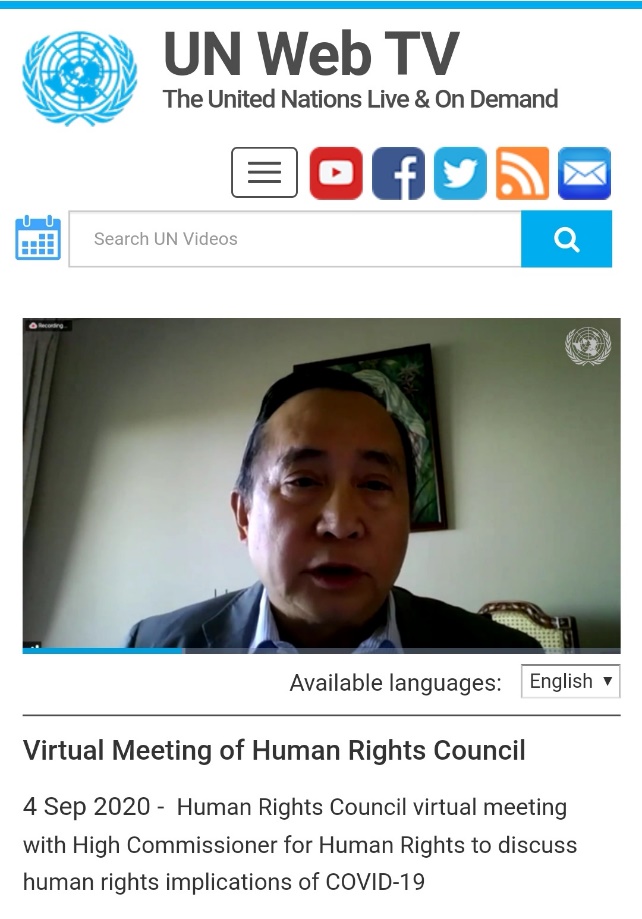
9 April 2020, Geneva, Switzerland. The Philippine government launched a Php 200 billion (Usd 3.9 billion) emergency subsidy program--- considered as the most comprehensive in Philippine history--- to support 18 million low-income households, as the country undertook measures to contain the Covid-19 pandemic. The measures include a Php 27 billion (Usd 542 million) economic package for affected workers and establishments, farmers and fisherfolks and micro, small, and medium enterprises, among others.
This was emphasized by Ambassador Evan P. Garcia, Philippine Permanent Representative to the UN in Geneva, during a Human Rights Council meeting today with UN High Commissioner for Human Rights Michelle Bachelet. The virtual meeting was convened through Zoom via live UN webcast, to discuss measures at the national, regional and global levels to manage the impact of the Covid19 pandemic especially on vulnerable sectors of the society.
Ambassador Garcia affirmed the Philippines’ support for the High Commissioner’s efforts to call for stronger international cooperation during and after the pandemic, drawing attention to the disproportionate toll of the crisis on vulnerable sectors and developing countries.
Bachelet pointed out that the impact of the pandemic on developing countries could be greater, “as a large portion of the population rely on daily income to survive” and these economies “have less capacity to absorb and mitigate the economic and social impact of the epidemic” and are most vulnerable to the resulting global recession.
Ambassador Garcia emphasized that the comprehensive national COVID-19 response of the Philippines continues to place due priority to supporting the vulnerable sectors of the population and managing the social and economic impact of the pandemic. He also shared that the Philippines has positively considered modestly contributing within its means to global emergency appeals for COVID-19 response.
Ambassador Garcia also underlined the need for attention and decisive global response to address the vulnerabilities of migrants and refugees in this situation, pointing out that “this global cross-cutting emergency has sharpened the demand for greater inclusivity and synergy in multilateral action, serving as a test of how recent global agreements on migration and refugees work on the ground.”
Ambassador Garcia also informed the Council that President Rodrigo R. Duterte declared on 18 March a unilateral ceasefire against the terrorist group CPP-NPA-NDF even before the UN Secretary-General called for global ceasefire on 23 March. He added that it was regrettable that the CPP-NPA-NDF had violated and exploited the ceasefire with their killings of indigenous peoples, attacks against government frontliners, and political agitation and exploitation of vulnerable groups.
In line with the concerns and priorities discussed by Bachelet and the vast majority of States, Garcia underscored the imperative of ensuring that actions are geared toward strengthening the Human Rights Council “as a platform for effecting real-world transformations through information sharing and open dialogue, constructive cooperation, technical cooperation, and capacity-building.”
In an earlier statement on 6 March, Bachelet called on States to place human rights front and center of COVID-19 response and to share information on efforts to mitigate socio-economic impacts. The Philippines, through a letter of 17 March, shared practices and measures taken to halt the spread of the pandemic and to alleviate the negative socio-economic effects on the Filipino people. The Philippines highlighted that national COVID-19 response and measures are fully compliant with international human rights laws and standards as well as national laws, further underscoring that such measures correspond to the state of the Philippine health system and pandemic preparedness and response capacities and pay attention to mitigating the disease’s disproportionate impact to the vulnerable sectors. The Philippines also cited its compliance with the reportorial requirements of the International Health Regulations and its consistent exercise of transparency in the management of COVID-19.#
